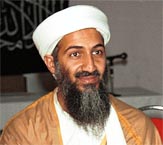Bin Laden's trail "not just cold; it is in a deep freeze"
 Kabul - The democratization of Afghanistan, despite its flaws, has been successful. For the second time since the overthrow of the Taliban regime, the population is to elect a new president on August 20.
Kabul - The democratization of Afghanistan, despite its flaws, has been successful. For the second time since the overthrow of the Taliban regime, the population is to elect a new president on August 20.
But the most important aim of the 2001 US-led invasion of the war-torn country has still not been achieved. Almost eight years after the September 11, 2001, terrorist attacks on the United States, the Americans have not managed to track down Osama bin Laden, the head of al-Qaeda.
Despite a price of 25 million dollars on his head and the use of missile-firing drones, special forces and intelligence services, the location of the world's most-wanted terrorist remains a mystery.
After years of searching for bin Laden and his deputy Ayman al-Zawahiri, the United States does not even have any promising leads. That was made clear by a memo from a meeting in New York of US security experts involved in the new Afghanistan and Pakistan strategy of the US government.
"Our counterterrorist campaign focused specifically on defeating al-Qaeda (emphasizing the vital necessity of capturing or killing bin Laden), is not just cold; it is in a deep freeze," the memo said.
The US expert quoted in the memo added that "for several years, we have had literally no accurate information about the physical whereabouts of either bin Laden or Ayman al-Zawahiri."
It added that, "We are still at a total loss to understand how al-Qaeda's complex and remarkably secure and efficient command and communications system actually functions."
However, the memo said the al-Qaeda leadership might be hiding out in the "comparatively safe and remote" city of Quetta, capital of Pakistan's Balochistan province.
If that is the case, then bin Laden and his associates could find themselves among old friends. The Afghan intelligence service, among others, is convinced that the Taliban leadership around Mullah Omar is in Quetta.
With his refusal to extradite his guest bin Laden to the United States, Mullah Omar provoked the US-led invasion after the 2001 suicide hijackings that struck New York and Washington.
Bin Laden's last-known hiding place was a cave in Tora Bora in eastern Afghanistan close to the border with Pakistan.
Shortly after the overthrow of the Taliban at the end of 2001, the sheikh, as his supporters call him, managed to flee. Since then, there has been speculation that bin Laden has been hiding somewhere along Pakistan's border with Afghanistan.
But then-Pakistani president Pervez Musharraf said at the end of 2004 that bin Laden's trail had gone cold.
However, two witnesses have said they saw the Egyptian doctor al-Zawahiri, Bin Laden's deputy, in a terrorist camp this spring in the north-western Pakistan district of Swat.
In June, a recorded message was ascribed to bin Laden. In it, the founder of al-Qaeda in his usual manner threatened the United States and the administration of President Barack Obama.
"The American people should prepare to continue to reap what the leaders of the White House are sowing in the years and decades to come," he said.
Experts, however, said they doubted that bin Laden himself still organizes attacks. But there is no doubt that the 52-year old is a symbolic figure for Islamist terrorism.
Bin Laden's campaign against the US does not only impress extremists. In a survey in Pakistan carried out last summer by the US organization Terror Free Tomorrow, more than one-third of respondents said they had a positive opinion of bin Laden. Former US president George W Bush was far behind him at less than 10 per cent.
It was Bush who said shortly after the attacks on New York and Washington that bin Laden was deceiving himself if he thought he could escape from the US and its allies.
In spring 2004, a spokesman for the US military in Afghanistan said it was sure it would catch bin Laden that year, but the US government said later that the promise was made in the heat of the moment.
Washington afterward answered questions about bin Laden with the vague statement that he would get the punishment he deserved - it was just a question of when.
However, it was also possible that bin Laden could triumph in the end.
The 2007 Pulitzer Prize-winning book The Looming Tower by US journalist Lawrence Wright, said the 2001 al-Qaeda attacks aimed to provoke the US into invading Afghanistan. It was bin Laden's hope, it said, that the US military would be defeated there just as those of the British and the Soviet Union were.
In view of the ever-worsening security situation in Afghanistan, even the US government would not predict victory there any more.
Its White Paper on US Policy Toward Afghanistan and Pakistan, released in March, said, "The danger of failure is real and the implications are grave." (dpa)